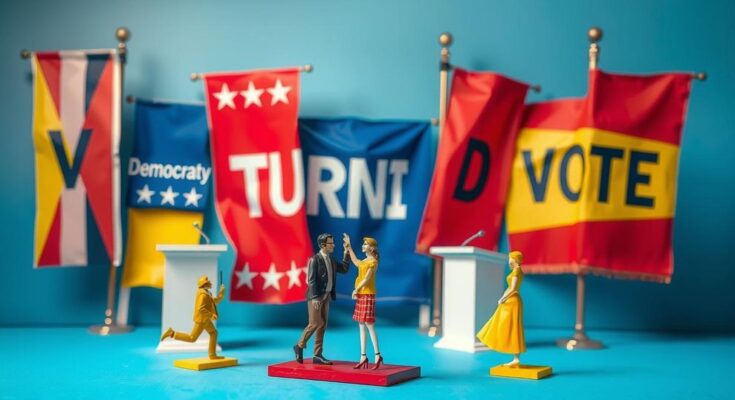President Trump’s assertion of a $21 million funding for voter turnout in India has led to a political uproar, with the BJP accusing Congress of seeking foreign interference. The Congress party refutes this claim, calling it nonsensical, while India’s foreign ministry expresses concern. Investigations are ongoing, and reports indicate that the funds were actually directed to Bangladesh, not India.
U.S. President Donald Trump’s comment regarding a purported $21 million spent to enhance voter turnout in India’s elections has ignited significant political controversy. This statement was made shortly after Elon Musk’s team announced the cancellation of funding linked to a U.S. agency responsible for foreign aid. The ruling Bharatiya Janata Party (BJP) described the proposed funds as “external interference” and accused the opposition Congress party of soliciting such intervention.
In response, the Congress party rebutted the allegations, labeling Trump’s assertions as “nonsensical,” and highlighted that no evidence has been presented to substantiate the claim. India’s Ministry of External Affairs expressed concern, categorizing the comments as “deeply troubling”. Foreign Ministry spokesperson Randhir Jaiswal classified the remarks as “premature” and indicated that investigations by relevant authorities were ongoing.
Upon taking office, Trump initiated measures to strengthen the U.S. economy, including the establishment of the Department of Government Efficiency (Doge), overseen by Musk. Doge aims to reduce federal spending and has taken controversial actions against USAID, which has been involved in humanitarian efforts since the 1960s. Musk has criticized USAID, and announced substantial funding cuts, including a $21 million allocation intended for voter turnout in India.
Defending these budget cuts, Trump commented that India is a wealthy nation, suggesting that it does not require external funding for voter engagement. He has raised questions regarding the rationale behind the claimed $21 million expenditure for voter turnout in India. These statements emerged following Indian Prime Minister Narendra Modi’s recent visit to Washington and discussions on military and trade agreements between the two nations.
The BJP has exploited a video clip of Congress leader Rahul Gandhi speaking abroad, where he suggested that foreign democracies, including the U.S. and European nations, were largely unaware of the deterioration of democratic processes in India. BJP leader Amit Malviya accused Gandhi of advocating foreign interference in India’s domestic affairs due to his comments.
Congress leader Jairam Ramesh has dismissed Malviya’s accusations and called for transparency from the government regarding the long-standing support of USAID for institutions during Modi’s administration. However, questions remain about the actual existence of the reported $21 million. Neither Trump nor Doge has confirmed the existence of such funding as related to India.
Reflecting on the situation, former election chief SY Qureshi has denied any receipt of such funds during his tenure (2010-2012). He rebuffed a claim made by Malviya regarding an agreement signed with an organization associated with George Soros, stating there were no financial obligations involved. Furthermore, recent investigative findings suggest that the $21 million was actually allocated to Bangladesh rather than India, with a substantial portion already expended.
The controversy surrounding President Trump’s claims of $21 million allocated for voter turnout in India highlights the complex interplay of domestic and international political dynamics. The ruling BJP and the opposition Congress have engaged in a vigorous debate regarding the implications of foreign involvement in India’s electoral processes. As investigations continue, the veracity of these claims remains unsubstantiated, prompting calls for transparency and accountability.
Original Source: www.bbc.com




